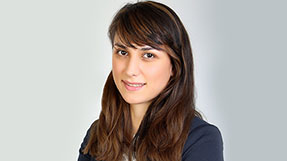Khoury News
From chemical engineering to computer science: Aida Sharif Rohani pivots careers
In 2018, Aida Sharif Rohani (Align MSCS ‘21) had a solid job in chemical engineering. But she yearned for something different — a career in computer science. With two chemical […]

In 2018, Aida Sharif Rohani (Align MSCS ‘21) had a solid job in chemical engineering. But she yearned for something different — a career in computer science. With two chemical engineering degrees and four years working in the industry under her belt, she wasn’t sure how she was going to get there.
That’s when Sharif Rohani learned about Khoury College’s Align program, Northeastern’s graduate computer sciences program tailored to students without a background in the field. She applied, fretted about whether she would be accepted, and finally received an answer — not only was she welcomed into the program, but Sharif Rohani got a scholarship from Pivotal Ventures, an investment and incubation company created by Melinda Gates.
“I loved working as an engineer, but it wasn’t as dynamic as I wanted,” Sharif Rohani said. “The Align program helped me change my career.”
Now, a few short years later, you’ll find Sharif Rohani on Northeastern’s San Francisco campus with a successfully defended master’s thesis and plans to pursue a professional position in machine learning after she graduates this May. She is the first Align student at Northeastern’s Bay Area campuses to complete an MS thesis in computer science.
“After these three years, I really feel prepared to go into a job in computer science,” Sharif Rohani said.
She has herself to thank for some of that preparedness. The first two semesters of the Align program, called the bridge, are designed to introduce students to the computer sciences, and Sharif Rohani had enough prior math and coding experience to easily navigate those courses.
During her third semester, the material began to get more complex, and that’s when her grit and perseverance shone through. She’d ask professors and teaching assistants for help, watch online videos, and spend hours parsing through sample problems.
“It’s very important to try all the examples in the book and the slides yourself before looking at the solutions.” Sharif Rohani would advise other students: “Take advantage of all the resources you have.”
As she settled into the Align program, Sharif Rohani set her eyes toward research opportunities. She loved being involved in research during her first graduate experience in chemical engineering and saw it as essential to truly grasping the concepts she was learning about in class. At a Khoury event, she approached Dean Carla Brodley, who connected her with Ricardo Baeza-Yates, the professor who would become her thesis advisor. (Sharif Rohani ended up taking CS 5800: Algorithms with him and later became teaching assistant for the course.) When Baeza-Yates suggested that she dig into the topic of measuring bias in machine learning, Sharif Rohani was immediately intrigued.
“As a feminist and someone who wants to challenge hierarchical classification, I found working on this subject a great opportunity to fight social injustice,” Sharif Rohani said.
The issue of bias, or prejudice, in artificial intelligence is a much-discussed issue in the tech world, with companies from Microsoft to Google being forced to reckon with the consequences. Machine learning models can be biased against a certain group or groups of people for a variety of reasons, Sharif Rohani explained. It can be introduced in the dataset used to train the model, the way the algorithm favors a certain group, or the way users interact with the algorithm. When machine learning models — like those used in credit scoring or resume screening — are biased against certain groups, it can have significant impacts on people’s lives.
Sharif Rohani’s thesis focused on measuring the amount of bias in datasets. In order to do this, she examined real-world datasets, such as those concerning autism or criminal recidivism. She measured the bias against selected groups, such as Black people or women, by using statistical methods and combining the results into a single percentage value. This single value can be used to more clearly compare the bias in different datasets than if several numbers were used.
“Working with Aida was a real pleasure due to her motivation to overcome all the hurdles that a graduate student without an undergraduate degree in computer science faces,” said Baeza-Yates, advisor to Sharif Rohani.
With the degree she needs to pursue her dream, Rohani Sharif is currently considering her next steps. She would love to be a machine learning engineer at a big company, but wants to work somewhere in line with her ethics. She’s also considering positions at NASA, where she worked last summer as a data science intern, developing a deep learning model that detects potentially dangerous anomalies in airplane flight data. Whatever she does next, she wants to make sure she’s making a positive impact on the world.
“I want to feel like I am working for a good purpose,” Sharif Rohani said. “I prefer to have a job with good effects on society.”
Subscribe to the Khoury College newsletter
The Khoury Network: Be in the know
Subscribe now to our monthly newsletter for the latest stories and achievements of our students and faculty